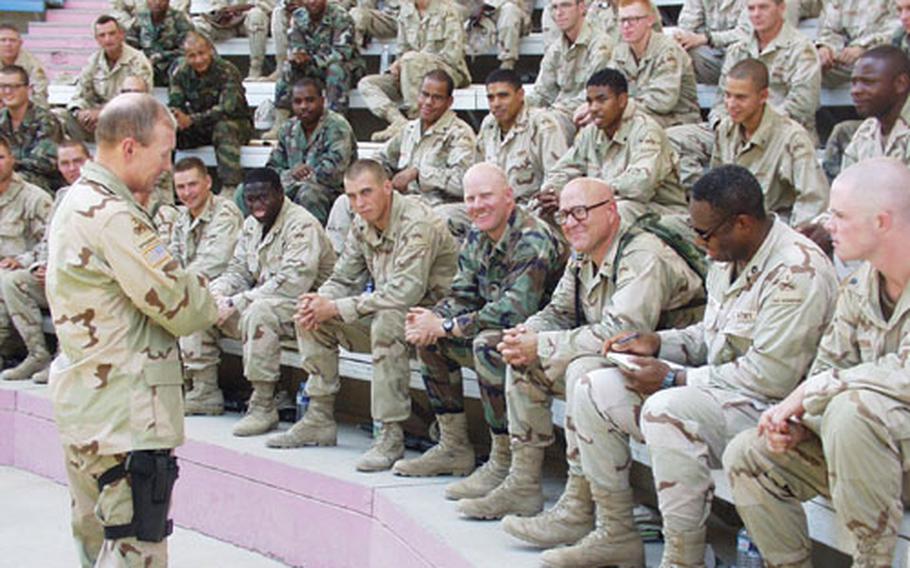
Gen. Martin E. Dempsey, commander of the Wiesbaden, Germany-based 1st Armor Division, talks in Baghdad on Aug. 9 to the "Bandits," the 1st Battalion of the 37th Armor. The temperature in the outdoor auditorium — which was partially shaded — was over 13O degrees. (Lisa Burgess / Stars and Stripes)
ARLINGTON, Va. — “The Bandits” — The 1st Battalion, 37th Armor Regiment — live on Baghdad Island, a small spit of land in northern Baghdad that extends into the Tigris River.
As military encampments go, it’s one of the roughest in Baghdad — “maybe a three or four on a scale of one to 10,” Gen. Martin E. Dempsey, commander of the Wiesbaden, Germany-based 1st Armored Division, told the Bandits during an Aug. 9 visit to the camp in 135-degree heat.
Every night, the Bandits go to sleep in their hot, stuffy tents to the sound of small-arms fire. Tracers make their way in the skies above.
And when the Bandits leave their compound on patrols, raids or supply runs, sometimes they don’t come back.
So it was no surprise to Dempsey that one of the first questions asked during his visit was “Sir, who is attacking us?”
Dempsey was characteristically blunt.
Right now, it’s former Saddam loyalists and criminals who are angry at U.S. troops’ attempts to interfere with their lawlessness. But all that’s about to change, he said.
The new enemy is terrorists, he warned. They all know the Americans are in Iraq, and the “they all want to try and get a piece of you.”
“Regional extremists are even now flocking to Baghdad because [in their eyes], it’s the superbowl,” Dempsey said. “They’re coming here now and starting to get organized.”
Dempsey is warning his troops to get ready for an enemy “that wants to make a big, big splash, like dropping the Palestine,” a major hotel where many Westerners live.
In an environment where one or two soldiers are attacked with improvised bombs every day, such an action seemed less likely to be aimed at civilians.
Then came the Aug. 19 bombing of the United Nations headquarters in Baghdad — the single worst postwar attack in Iraq, and one that took the lives, not of U.S. soldiers, but civilians.
On Thursday, the top U.S. military commander in the Persian Gulf, Army Gen. John Abizaid, the head of the U.S. Central Command, told Pentagon reporters that terrorism the “number one security threat” in Iraq.
But for U.S. commanders such as Dempsey, who are on the ground every day in Iraq, an attack like the one on the U.N. complex was simply a matter of time.
Dempsey said the biggest threats to the coalition are, in order of seriousness, former Saddam Hussein loyalists, common criminals and terrorists.
“When Saddam Hussein left, he emptied his armories, and he emptied his jails. He did it on purpose, so the people of Baghdad would wish for his presence as a leader.
“But what we’re seeing happening over time is that the former regime is losing influence,” Dempsey, who took his command in July, said. “So what they’re going to try to do is to blend into the criminal element so they can create more chaos.”
However, “to me, [former regimists and criminals] are not the dangerous enemy,” Dempsey said.
Such people are motivated by a lust for power and money, “and we can dry that up. We are drying it up, and doing a better job every day,” Dempsey said.
U.S. troops are also focusing on training a new Iraqi police force, one that should be 16,500 men strong by next spring, Dempsey said. The court and prison systems are also coming back, in a more democratic and just form than under Saddam.
As the regimists give up or are captured or killed, and criminals are starting to get pulled off the street, the threat to both coalition forces and Iraqis is already beginning to shift, Dempsey said.
Most of the 1st AD deployed to Iraq on May 1, and will remain there through April or May 2004. Dempsey took command of the division in July and will pin on his second star in October.
By the time the division is scheduled to leave Iraq, Dempsey said, two of its main goals are to defeat the remaining loyalist members of the regime and “neutralize” terrorist forces.
By “neutralizing,” Dempsey said he meant “stopping [the terrorists’] ability to conduct mass attacks” against U.S. military forward operating bases; the Baghdad Palace complex, where U.S. civil administrator L. Paul Bremer and other coalition officials live and work; and the Al Rashid Hotel, where troops and other U.S. officials live.
He said he is also determined to protect Baghdad landmarks such as the Palestine and Sheraton Hotels, which house Western charity workers and journalists. Other so-called “soft targets,” which generally cannot be protected using traditional military means, such as guard towers, high walls and extensive armor are on his watch list.
Instead of being last on the list, terrorists are becoming the most deadly threat, Dempsey said.
Even after the 1st AD goes home, the job will remain, however, Dempsey said.
The extremists “are dangerous, because they will give their lives for the cause,” Dempsey said. “We will have to fight them as long as we are here” in Iraq.